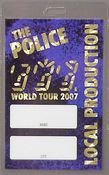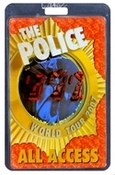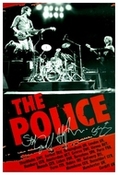
The Police are playing against themselves...
It's a funny thing with "The Police."
On the one hand, you can't deny them some important contributions to the development of pop culture; on the other hand, there remain conceits, which primarily concern the trio's approach and approach, as well as Sting's somewhat disgusting do-gooder superstar post-career.
On the one hand, one might think that, especially today, when there are several guitar bands that at least echo the old Police sounds, a window of opportunity would be open for a reassessment or rediscovery; on the other hand, a classic cash-in comeback tour like this (also already back in the day) is a hindrance.
Just like in the old days: The Police are always in the whirl of one-on-the-other discussion. There's just one difference: with age, their contours become clearer.
Last night's concert at the Vienna Stadthalle made little sense. The thousands of people who came to have their memories confirmed were highly satisfied with the embellished variations of the old hits, but they would probably have been more enthusiastic about an elegantly farted version of Roxanne (we remember other, higher quality reunions like those of the Velvet Underground or Roxy Music).
The few younger ones were lured by the 80s blasts unleashed in the Hit Disco and got to see and hear a fully fit Sting (with new muscle mass), a significantly aged Stewart Copeland (who no longer had the strength to offer a second vocal alongside drumming; it came from a tape), and Andy Summers, who had always been taciturn and reduced to throwing in his spherical surfaces (well, mostly only via the video walls anyway) (in the usual minimum-performance city hall quality).
During their heyday in the early 80s, it was the energetically forward-rushing interplay of these three simple elements, which combined like water, earth, and fire to create a spectacle, and with their outrageously clever blend of post-punk, power pop, and reggae elements, that made the Police project unavoidable and invincible for a while.
Even though you knew the three weren't school friends who had learned their moves in the rehearsal room, but rather a jazz musician from Newcastle, an American session drummer with ties to the business and CIA, and a quirky guitarist from the avant-garde world of Soft Machine.
Three professionals who had met with an idea and the motto "Let's make lots of money!"
You could now declare that so unsympathetic and so uncool that you don't even need to bother with The Police anymore. And there's a lot that helps with this: the didacticism of former teacher Gordon Sumner (Sting), the educated-middle-class pomp and circumstance of some of the lyrics, and more.
On the other hand, it was The Police who took the purely fashionable use of the newly discovered reggae sound in mainstream pop of the early 80s to the next level.
It was Sting who introduced the radical form of dub and played around with it, both on albums and then at live concerts. The Police boys sent Sting's "Eeek-oho-ho!" voice, his fluttering bass, and a few sibilants through the echo chambers, filling not just rooms but entire stadiums. That was a real achievement; it brought a new sonic awareness to pop music. And that despite rock-minded dissenters who consider such things unmanly or gay (and still do; the idiot purists aren't dying out).
And to be honest, I don't care if it's just a bad jazz musician doing it to gain distinction points.
The fact that Sting and Copeland were and aren't wild punks, but just bad jazz musicians with a clever plan, becomes all the more apparent in a performance of their age like yesterday's concert.
Songs that they had previously shot into orbit like shooting stars, wild, spiky-haired quickfire hits, now came across with a bit of belly and in a cosy way; 'Driven To Tears' and 'Truth Hits Everybody' were bound to make themselves ridiculous in this way.
Only on 'Every Little Thing She Does Is Magic' did Summers play a guitar figure that suggested where he would have ended up without the Police: in the guitar wonderland right next to Robert Fripp. However, he then ruined these brief positive impressions with the horror called solo, the nightmare of every righteous post-punk.
The Police never really meant anything to me as a band – I do have bad memories of that brief phase around their triumphant US tour and that NME cover, when they were the biggest rock band on the planet for a few months: They knew how to flicker, and that doesn't happen often enough anyway.
The very brief period when they interested me, almost as a phase of my life, during their dark phase just before the end, and then also with their last album (when Sting was already steaming smart-ass but sold it cleverly), wasn't a gut feeling either. I still partially understood a surprising number of lyrics, especially from 'Synchronicity,' but anything close to my heart, no...
Sting's later, quite horrific artistic path, this "saving the world with bland bar jazz for bland adults" package (which, however, differed so woefully little from the "saving the world with bland bar jazz for bland adults who think they're rebels" project that took place in regions of post-mod that wish to remain unnamed), impressively confirmed this.
Since then, ever since the Police ended, one could never be sure what would have happened if. This stupid game of "What if the Beatles had never split up?", "What if Hendrix/Cobain had survived?", "What if Marley hadn't had cancer?"
Hardly any of it would have been worthy or dignified, quite the opposite.
And what The Police would have been/become if Sting hadn't forced himself into his society solo role, we've finally seen: a highly mature, technically interesting, but completely worthless in terms of drive and vibe, jazzy version of what was once fresh and with a few barbs.
People are all too happy to suppress and downplay the not-so-great things of the past. In that respect, it's actually quite good when a few old sappers come along every now and then, shattering their own myth and tearing down the charged projections of those who are open-minded.
'Police' in Vienna: A message in a bottle from a completely different era...
The legendary band was acclaimed at the Stadthalle, but didn't entirely convince.
A message in a bottle from a completely different era was heard yesterday, Wednesday, at the Vienna Stadthalle: Sting, Stewart Copeland, and Andy Summers performed together again as 'Police,' the band that left behind classics like 'Roxanne' and 'Every Breath You Take' and had categorically ruled out a comeback for two decades. The first Vienna concert in just as long turned out to be a highly acclaimed evening.
The opening with 'Message In A Bottle' and a friendly 'Servus Wien' from Sting set the tone for the performance: handcrafted pop for the discerning, with plenty of compact punch and no unnecessary frills. The well-known hits, in particular, weren't necessarily the highlights, especially the still-unfunny 'De Do Do Do, De Da Da Da' and 'Roxanne' as the first encore.
Standouts included 'Don't Stand So Close To Me' and 'Can't Stand Losing You', the final number before the encore. But this concert in particular can't be reduced to individual numbers – watching these dedicated musicians and their renewed enthusiasm for playing was enjoyable even when the concert wasn't particularly exciting. This was certainly the case for extended periods.
The battle of egos that plagued Police early on has, at least in the impression that they've evolved into a relaxed old-boy band. Now, even the youthfully fit Sting, who once obsessively shoved himself into the spotlight, sings and plays simply, without any ambition to be a centre of attention.
But actually, a little resentment among the musicians might not have hurt: In the new 'Police' constellation, guitarist Summers is given an inordinate amount of time for his solos, which, while witty, edgy, and exciting, became less and less filling over the course of the evening. And Copeland bustled around behind his drums like in his prime – at times, it became a bit overly virtuosic.
Nevertheless, the band's spartan approach is a joy for every pop fan: How long has it been since we've seen a three-piece band so pure and solitary on a pop stage? Police don't need backing musicians, an oversized light show, or stupid audience comments. Here are three talented musicians at work who can play music. The fact that this is worth mentioning isn't a good sign for the business.
Sting himself, who has aged far less and therefore stood out from the band yesterday like never before, showed right from the start: His voice has matured in a positive way, without losing its distinctive style.
Sting's voice has always been a trademark. Even though the high notes may sound a bit strained than before, his vocals have gained volume overall and carried the evening well.
The Vienna performance was a typical legendary concert: By today's standards, the three gentlemen's music would at most earn hearty laughs from record label sharks – too handmade, too complicated, too authentic, and also too stuffy for today's market.
And even if you're into exactly those things, the performance, which was enthusiastically received by the audience, wasn't entirely successful: The self-restraint in sound and appearance did lead to some empty spaces. But to have been there when 'Police' played again – it was definitely worth it.
(c) Tirol.com by Georg Leyrer
September 19, 2007
SET LIST
- Message In A Bottle
- Synchronicity II
- Walking On The Moon
- Voices Inside My Head
- When The World Is Running Down You Make The Best Of What's Still Around
- Don't Stand So Close To Me
- Driven To Tears
- Truth Hits Everybody
- Hole In My Life
- Every Little Thing She Does Is Magic
- Wrapped Around Your Finger
- De Do Do Do, De Da Da Da
- Invisible Sun
- Walking In Your Footsteps
- Can't Stand Losing You
- Roxanne
- King Of Pain
- So Lonely
- Every Breath You Take
- Next To You






